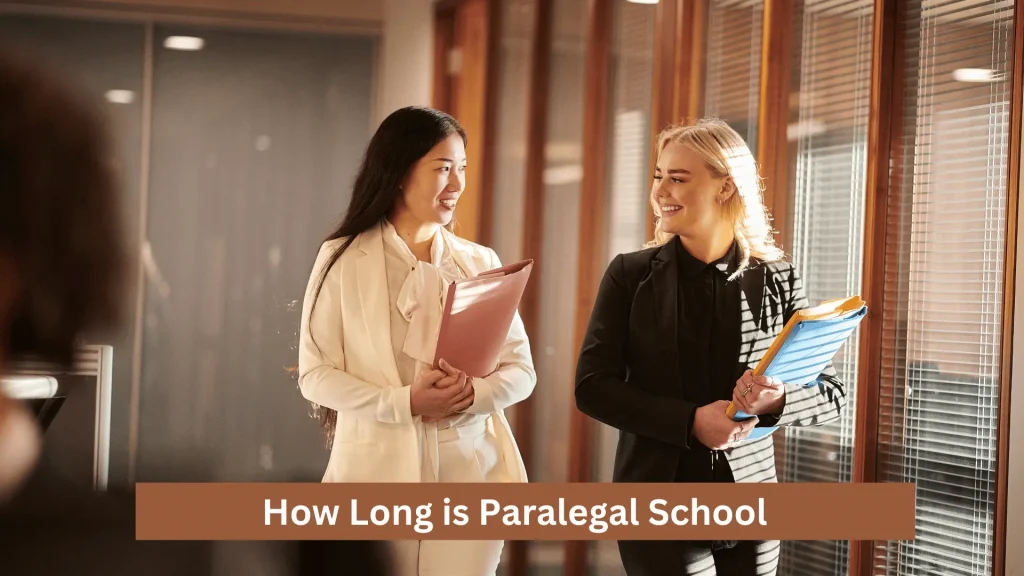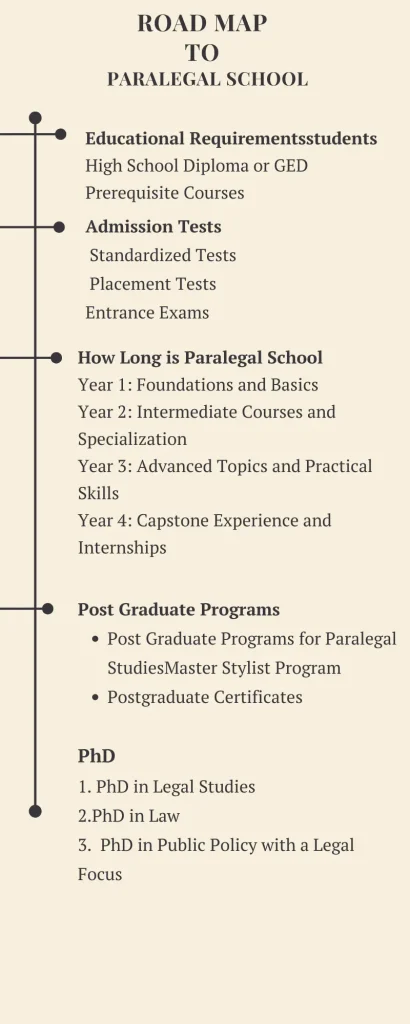How Long is Paralegal School
How Long is Paralegal School? The duration of paralegal school varies based on the program type. Certificate programs typically take about one year, while associate degree programs require two years. For those pursuing a bachelor’s degree, the program can take up to four years. So, how long is paralegal school? It depends on your chosen path.
What is Paralegal School
Paralegal school provides specialized education and training for individuals seeking to become paralegals. These programs cover legal research, document preparation, and various aspects of law practice, preparing students to assist attorneys in their work. Paralegal schools offer certificate programs, associate degrees, and bachelor’s degrees, each with varying durations.

Attending paralegal school equips students with the necessary skills and knowledge to support lawyers effectively. The curriculum often includes courses in legal writing, ethics, and specific areas of law like criminal, corporate, and family law. Graduates are well-prepared to enter the workforce and contribute to the legal field in various settings.
How Long is Paralegal School
Year 1: Foundations and Basics
In the first year, students are introduced to the fundamentals of the legal system and paralegal profession. Courses typically include:
Introduction to Law
Legal Research and Writing
Legal Terminology
Ethics in Law
These foundational courses help students understand the basics of legal practice and develop essential skills in research and writing.
Year 2: Intermediate Courses and Specialization
The second year focuses on more advanced topics and begins to delve into specific areas of law. Courses may include:
Civil Litigation
Contract Law
Criminal Law
Family Law
Students start to specialize in areas of interest while continuing to build on their legal research and writing skills.
Year 3: Advanced Topics and Practical Skills
In the third year, students take advanced courses and practical skill development. Courses may cover:
Real Estate Law
Corporate Law
Advanced Legal Writing
Technology in Law
Practical skills such as case management and legal software use are emphasized, preparing students for real-world paralegal tasks.
Year 4: Capstone Experience and Internships
The final year often includes a capstone project or thesis and practical experience through internships. Key components may include:
Capstone Project or Thesis
Internship in a Law Firm or Legal Department
Elective Courses in Specialized Areas of Law
Students apply their knowledge in practical settings, gaining hands-on experience and preparing for their professional careers.

How to Enter Paralegal School
Educational Requirements
High School Diploma or GED: Most paralegal programs require applicants to have a high school diploma or GED equivalent.
Prerequisite Courses: Some programs may require completion of certain prerequisite courses such as English, history, or social studies.
Bachelor’s Degree: For certain advanced or accelerated paralegal programs, a bachelor’s degree in any field might be required.
Entry Tests
Standardized Tests: Some programs might require SAT or ACT scores, especially if applying to a bachelor’s degree program.
Placement Tests: Community colleges and some universities may require placement tests in subjects like English and mathematics to determine appropriate course levels.
Entrance Exams: Certain schools may have their own entrance exams to assess applicants’ suitability for the program.
Application Process
Application Form: Complete the school’s application form, available online or from the admissions office.
Transcripts: Submit official high school or college transcripts as required.
Personal Statement: Write a personal statement or essay detailing your interest in becoming a paralegal.
Letters of Recommendation: Provide letters of recommendation from teachers, employers, or professionals who can attest to your qualifications and character.
Application Fee: Pay the application fee, which varies by institution.
Financial Aids
Federal Student Aid: Apply for federal financial aid through the Free Application for Federal Student Aid (FAFSA).
Scholarships: Look for scholarships specific to paralegal studies or general academic scholarships offered by the institution or external organizations.
Grants: Investigate grants such as the Federal Pell Grant, which do not need to be repaid.
Loans: Federal and private student loans are available to cover tuition and other expenses.
Work-Study Programs: Some schools offer work-study programs that allow students to work part-time while attending school to help cover costs.
Institutional Aid: Many schools have their own financial aid programs, including need-based and merit-based aid.
By carefully considering these aspects, prospective students can better prepare for their journey into paralegal education and make informed decisions about their academic and financial futures.
Post Graduate and PhD Programs for Paralegal School
1. Post Graduate Programs for Paralegal Studies
a. Postgraduate Certificates
Overview: Aimed at individuals who already hold a degree and wish to gain specialized knowledge in paralegal studies.
Duration: Typically 6 months to 1 year.
Focus Areas: Advanced legal research, complex legal procedures, and specialized areas of law such as intellectual property or environmental law.
Requirements: Bachelor’s degree in any field; some programs may require a background in law or legal studies.
b. Master’s Degree in Paralegal Studies
Overview: Designed for those seeking advanced knowledge and leadership roles in the paralegal profession.
Duration: Generally 1 to 2 years.
Focus Areas: Advanced legal concepts, management skills for legal departments, and in-depth legal theory.
Requirements: Bachelor’s degree in any field; some programs may require a professional background in law or paralegal work.
c. Master of Legal Studies (MLS)
Overview: Provides a comprehensive understanding of legal principles for non-lawyers, including those in paralegal careers.
Duration: Typically 1 to 2 years.
Focus Areas: Legal theory, legal research, and specialized legal topics.
Requirements: Bachelor’s degree in any field.
d. Master of Laws (LL.M.)
Overview: Advanced degree for legal professionals seeking deeper specialization or a career shift into specific legal fields.
Duration: 1 year (full-time) or 2 years (part-time).
Focus Areas: Specialized legal fields such as corporate law, international law, or litigation.
Requirements: Juris Doctor (JD) or equivalent law degree.
2. PhD Programs in Paralegal Studies and Related Fields
a. PhD in Legal Studies
Overview: Aimed at those pursuing careers in academia, research, or high-level legal consultancy.
Duration: 3 to 5 years.
Focus Areas: Legal theory, legal research methodologies, and advanced legal issues.
Requirements: Master’s degree in a related field; strong research background.
b. PhD in Law
Overview: A research-intensive degree focusing on original contributions to legal scholarship.
Duration: 3 to 7 years.
Focus Areas: Various areas of law depending on research interests, such as constitutional law, international law, or legal theory.
Requirements: Master’s degree in Law or a related field; a well-defined research proposal.
c. PhD in Public Policy with a Legal Focus
Overview: Combines legal education with public policy, preparing graduates for roles in legal policy analysis and development.
Duration: 4 to 6 years.
Focus Areas: Public policy development, legal frameworks for public policy, and policy analysis.
Requirements: Master’s degree in a related field; research proposal related to legal policy.
Top 10 Paralegal Schools

1. University of California, Berkeley
Program: Paralegal Certificate Program
Duration: 6 months (full-time) or 12 months (part-time)
Highlights: Comprehensive curriculum, expert faculty, and a strong reputation in legal education.
2. Georgetown University
Program: Paralegal Studies Certificate Program
Duration: 6 months (full-time) or 12 months (part-time)
Highlights: In-depth courses, advanced specializations, and excellent networking opportunities.
3. New York University (NYU)
Program: Paralegal Studies Certificate Program
Duration: 6 months (full-time) or 12 months (part-time)
Highlights: Prestigious program with flexible options and a strong focus on legal research and writing.
4. University of Denver
Program: Paralegal Certificate and Associate Degree Programs
Duration: Certificate: 6 months (full-time) or 12 months (part-time); Associate Degree: 2 years
Highlights: Practical experience opportunities, extensive curriculum.
5. University of Washington
Program: Paralegal Studies Certificate Program
Duration: 9 months (part-time)
Highlights: Focus on practical skills, legal research, and career preparation.
6. Loyola University Chicago
Program: Paralegal Studies Certificate Program
Duration: 6 months (full-time) or 12 months (part-time)
Highlights: Advanced legal training, diverse course offerings.
7. California State University, Los Angeles
Program: Paralegal Certificate Program
Duration: 6 months (full-time) or 12 months (part-time)
Highlights: Comprehensive curriculum with practical experience and legal skills training.
8. Pace University
Program: Paralegal Studies Certificate Program
Duration: 6 months (full-time) or 12 months (part-time)
Highlights: Strong focus on professional development and legal theory.
9. Boston University
Program: Paralegal Studies Certificate Program
Duration: 6 months (full-time) or 12 months (part-time)
Highlights: Specialized tracks, hands-on learning opportunities.
10. St. Mary’s University
Program: Paralegal Certificate and Degree Programs
Duration: Certificate: 6 months (full-time) or 12 months (part-time); Degree: 2 years
Highlights: Focus on legal practice and professional development.
Factors Affecting the Length of Paralegal School
The length of paralegal school can vary widely based on several factors. Here’s a detailed overview of the key elements that influence how long it takes to complete a paralegal education program:
1. Type of Program
Certificate Programs:
Duration: Typically 6 months to 1 year.
Details: These programs are designed for quick entry into the paralegal profession. They offer intensive, focused coursework on essential skills and knowledge.
Examples: University of California, Berkeley, Georgetown University.
Associate Degree Programs:
Duration: Usually 2 years.
Details: These programs offer a more comprehensive education, covering a broader range of topics including general education courses.
Examples: University of Denver, California State University, Los Angeles.
Bachelor’s Degree Programs:
Duration: Typically 4 years.
Details: This is a more extensive program that includes in-depth legal studies, general education requirements, and often opportunities for specialization.
Examples: New York University (NYU), Boston University.
2. Full-Time vs. Part-Time Enrollment
Full-Time Enrollment:
Duration: Shorter overall duration due to a higher course load.
Details: Students take more courses per term and complete the program in a condensed timeframe.
Example: Certificate programs at Georgetown University or University of California, Berkeley.
Part-Time Enrollment:
Duration: Longer duration as students take fewer courses per term.
Details: Allows students to balance education with work or other responsibilities.
Example: Part-time options for the Paralegal Certificate Program at University of Washington.
3. Online vs. In-Person Programs
Online Programs:
Duration: Can vary based on the flexibility of the course schedule.
Details: Offers more flexibility in completing coursework but may still follow a set schedule for assignments and exams.
Examples: Pace University, St. Mary’s University.
In-Person Programs:
Duration: Often follows a more structured schedule.
Details: Typically follows a set academic calendar and offers a traditional classroom experience.
Examples: Loyola University Chicago, California State University, Los Angeles.
4. Accelerated Programs
Accelerated Programs:
Duration: Shorter than standard programs due to a more intensive curriculum.
Details: Designed for students who can commit to a more rigorous schedule and complete the program faster.
Examples: New York University (NYU), University of Denver.
Final Verdict
The length of paralegal school varies depending on program type, enrollment status, and other factors. Understanding these elements helps you choose the best path for your career goals. Whether you pursue a certificate or degree, each program offers unique opportunities for professional growth in the legal field.
FAQs
1. How long does it take to complete a paralegal certificate program?
Answer: Paralegal certificate programs typically take 6 months to 1 year to complete, depending on whether you study full-time or part-time.
2. What is the difference between an associate degree and a bachelor’s degree in paralegal studies?
Answer: An associate degree takes about 2 years and covers fundamental paralegal skills, while a bachelor’s degree takes 4 years and offers more comprehensive legal education.
3. Can I complete a paralegal program online?
Answer: Yes, many paralegal programs offer online options, allowing flexibility for students to complete coursework from home.
4. Do paralegal programs require internships?
Answer: Some paralegal programs require internships or practical experience as part of the curriculum, while others offer it as an optional component.
5. What financial aid options are available for paralegal programs?
Answer: Financial aid options for paralegal programs include federal student aid, scholarships, grants, and work-study opportunities.
